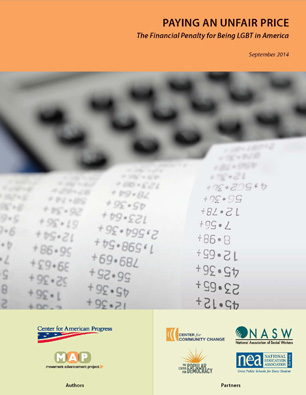The Bottom Line:
Paying an Unfair Price: The Financial Penalty for Being LGBT in America paints a stark picture of the added financial burdens faced by LGBT Americans because of anti-LGBT laws at the national, state and local levels. These laws contribute to devastating cycles of poverty and create unfair financial penalties in the form of higher taxes, reduced wages and Social Security income, increased healthcare costs, and more.
The report documents how inequitable laws harm the economic well-being of LGBT people in three key ways: by enabling legal discrimination in jobs, housing, credit and other areas; by failing to recognize LGBT families, both in general and across a range of programs and laws designed to help American families; and by creating barriers to safe and affordable education for LGBT students and the children of LGBT parents.
Paying an Unfair Price offers broad recommendations for helping strengthen economic security for LGBT Americans, such as instituting basic nondiscrimination protections at the federal and state level; allowing same-sex couples to marry in all states; allowing LGBT parents to form legal ties with the children they are raising; and protecting students from discrimination and harassment on the basis of sexual orientation and gender identity.
Paying an Unfair Price was co-authored by the Movement Advancement Project and the Center for American Progress, in partnership with the Center for Community Change, the Center for Popular Democracy, the National Association of Social Workers, and the National Education Association.
Paying an Unfair Price: Full Report (Updated Nov. 2014)Download Paying an Unfair Price: Condensed Report (Updated Nov. 2014)Download Paying an Unfair Price: Executive SummaryDownload Paying an Unfair Price: InfographicsDownload Video: Paying an Unfair Price - Maria's StoryDownload Google Hangout: Paying an Unfair PriceDownload
Recommended citation:
Movement Advancement Project and Center for American Progress. September 2014.
Paying an Unfair Price: The Financial Penalty for Being LGBT in America.
https://www.lgbtmap.org/unfair-price (date of access).
Share Your #UnfairPrice
Join us on social media in sharing how anti-LGBT laws make it harder for you to be financially secure. Be sure to use the hashtag #UnfairPrice to share your story.


